To prepare a meal in someone else’s house is always something of an improvisational dance.
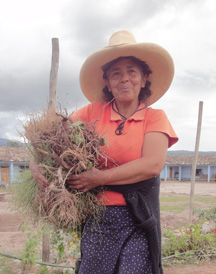 Even stepping next door to a neighbor’s kitchen will find you entering a foreign territory of unfamiliar foods, flavors, and recipes. Fly half way around the world, start cooking in a different hemisphere, and the mysteries deepen. Suddenly, how to peel a clove of garlic becomes an exercise in international diplomacy.
Even stepping next door to a neighbor’s kitchen will find you entering a foreign territory of unfamiliar foods, flavors, and recipes. Fly half way around the world, start cooking in a different hemisphere, and the mysteries deepen. Suddenly, how to peel a clove of garlic becomes an exercise in international diplomacy.
Or, so I discovered not too long ago when I traveled to La Grama, a tiny town nestled in a gorgeous mountain valley of Northern Peru’s Andean Highlands. It can only be reached by a road that’s called Trenta Tres Curvas, (Thirty Three Curves), a dizzying series of switchback turns winding down through the Andes, until one finally arrives in a rural village that has spotty electricity, no mail service, and seemingly more dogs than humans.
The people who live in La Grama are poor and, as a result, eat a fairly unhealthy diet. They mostly subsist on potatoes and guinea pig.
Downtown La Grama is a small grid, maybe four city blocks square, where a population of 300 live in one-story mud brick homes. The town’s roads are made of cinnamon-colored dirt that’s deeply rutted and pocked with large pot holes. In what seems nearly an absurdist touch, there are freshly-poured and quite elaborate concrete sidewalks bordering each side of these unpaved thoroughfares. It rains frequently here, though, and when streets melt into the consistency of pudding, these sidewalks are much appreciated.
A decade ago, my friend, Jordan Mallah, was a Peace Corps worker in La Grama. Every few years since, Jordan arranges a “service” trip where he convinces a group of people from the United States to come build a local library, or assist on a town-wide water project. His idea for 2011, was to plant an organic vegetable garden behind el colegio, the local grammar school.
The people who live in La Grama are poor and, as a result, eat a fairly unhealthy diet. They mostly subsist on potatoes and guinea pig. You read that correctly: guinea pig. Hordes of these cute, but clueless-looking creatures scurry about (and shit upon) the dirt floors of most houses. When it’s dinner time, people clonk one on the head, and shuck off its fur; a quick chop, and into a fry pan the pieces go. Head, tail, claws – every morsel is consumed. Guinea pig tastes like the dark meat of a not-very-flavorful chicken. Not bad, but perhaps not as good for you as green beans, or Swiss Chard. At least that’s what Jordan thinks. Hence, this garden project.
Yes, I realize this sounds benevolently imperialist: know-it-all Americans imposing their culinary values on the third world. (Zucchini, good. Guinea pig, gross.) Sure, sure, I had my hesitations, too, at first. But, I put them aside, and told Jordan I’d help him with the garden. What’s more, I found myself volunteering to cook meals for the crew he’d rounded up — meaning, lunch and dinner, every day for a week, for a dozen of Jordan’s friends coming from the United States, as well as a roughly an equal number of Peruvians who’d join us in planting, once we got to La Grama.
 My base of operations was the modest but hugely cheerful house of Jordan’s friend, Nattie. Her house was a logical choice as Nattie’s kitchen was more modern that any other I saw in La Grama. She has a small refrigerator, a cooktop with four small burners, and an oven. (These last two appliances could not be operated simultaneously, however, as each ran from the same propane tank.) A key factor, too, was that Jordan convinced Nattie on a previous visit to stop breeding guinea pigs and, instead, to plant a garden in her backyard. When I landed there, Nattie immediately dragged me outside to tour this Eden. Her beets, pumpkins, lettuces, celery and strawberries, among many other plants, were all thriving and available to be used in meals I’d cook.
My base of operations was the modest but hugely cheerful house of Jordan’s friend, Nattie. Her house was a logical choice as Nattie’s kitchen was more modern that any other I saw in La Grama. She has a small refrigerator, a cooktop with four small burners, and an oven. (These last two appliances could not be operated simultaneously, however, as each ran from the same propane tank.) A key factor, too, was that Jordan convinced Nattie on a previous visit to stop breeding guinea pigs and, instead, to plant a garden in her backyard. When I landed there, Nattie immediately dragged me outside to tour this Eden. Her beets, pumpkins, lettuces, celery and strawberries, among many other plants, were all thriving and available to be used in meals I’d cook.
Nattie is the unofficial “mayor” of La Grama. Everyone knows her, since she runs a Movistar franchise (it’s one of Latin and South America’s major telecommunications companies) from her kitchen, selling time for cellular phones. She also is a part-time baker of cakes, which she sells for parties and birthday celebrations. From dawn to dusk, five minutes do not pass without someone showing up at Nattie’s door. Not only is she quite literally the link between La Grama and the outside world, but Nattie is also life coach, therapist and yenta for all residents. Nothing happens in this town without Nattie hearing about it seconds later. Never have I met someone so irrepressibly hospitable. To have a group of Americans descend on her house for a week, not to mention having me turn her kitchen upside down as I as cooked, appeared not to faze Nattie in the least.
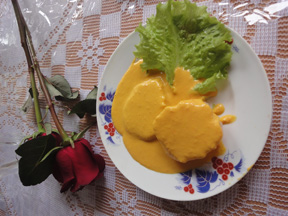 The very first day we arrived, I got the lay of the land, as I watched Nattie quickly throw together a Peruvian lunch. She served us papas alla huancaina, or potatoes, smothered in a sauce made of milk, cheese, crackers, and yellow pepper. Then, spaghetti with a pesto made of spinach, basil and soy milk. Not only did she cook all this food in well under an hour (a time period that included her picking vegetables from her garden, and washing them), but she did so while simultaneously continuing to attend to her never-ending stream of Movistar customers, or other people needing help or advice. No one was shooed away, everyone was greeting with a smile, and a chorus of “Que linda! Que linda! Que linda!” (This means, how beautiful, or how nice, in Spanish.) It was as if each person were a best friend she’d been hoping would stop by.
The very first day we arrived, I got the lay of the land, as I watched Nattie quickly throw together a Peruvian lunch. She served us papas alla huancaina, or potatoes, smothered in a sauce made of milk, cheese, crackers, and yellow pepper. Then, spaghetti with a pesto made of spinach, basil and soy milk. Not only did she cook all this food in well under an hour (a time period that included her picking vegetables from her garden, and washing them), but she did so while simultaneously continuing to attend to her never-ending stream of Movistar customers, or other people needing help or advice. No one was shooed away, everyone was greeting with a smile, and a chorus of “Que linda! Que linda! Que linda!” (This means, how beautiful, or how nice, in Spanish.) It was as if each person were a best friend she’d been hoping would stop by.
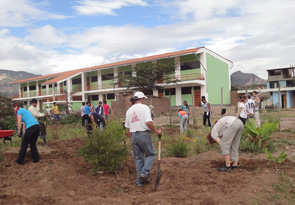 Well-fed, and excited about the adventure ahead, Jordan led us off to the field behind el colegio. Here, my fears returned. It looked like the town dump. The field was choked with weeds, and ankle-deep with garbage. As we surveyed the spot, there was much discussion about the rocky soil, as well as the ground’s steep incline. And what about water? During the rainy season, there would be plenty. In the dry months, Jordan explained that he’d convinced some of the folks at Peace Corps to donate money for a small pump, which would keep things moist. Up until now, people had jury-rigged an “irrigation” system, burying empty plastic bottles among the plants, each with a pin hole at their bottom, so water inside would seep more slowly into the ground.
Well-fed, and excited about the adventure ahead, Jordan led us off to the field behind el colegio. Here, my fears returned. It looked like the town dump. The field was choked with weeds, and ankle-deep with garbage. As we surveyed the spot, there was much discussion about the rocky soil, as well as the ground’s steep incline. And what about water? During the rainy season, there would be plenty. In the dry months, Jordan explained that he’d convinced some of the folks at Peace Corps to donate money for a small pump, which would keep things moist. Up until now, people had jury-rigged an “irrigation” system, burying empty plastic bottles among the plants, each with a pin hole at their bottom, so water inside would seep more slowly into the ground.
The school principal now arrived. He was accompanied by a few other men who had wheelbarrows, shovels, and pick axes. Jordan assigned tasks, and distributed these tools. We got to work tilling the land, breaking up hard clods into a more malleable layer of top soil. There was an incredible amount of junk mixed into this soil. My guess was that many generations of school kids have dallied back here, snacking on candy and other treats, and then simply dropped the foil wrappers, and plastic spoons and forks, when they were done eating.
An old woman worked behind us, gathering up whiskery weeds we unearthed. She then patiently arranged them into neat bundles which she would dry, and turn into brooms. Several pretty young girls from the school had showed up, too. Their idea of “work outfits” was adorably misguided, as they were resplendent in flip flops, tight jeans and halter tops. I chatted with them, trying to summon back the Spanish I’d learned when I was their age. Our shared smiles, though, and the fact we were all laboring together, side by side, was probably our best form of communication.
At one point, I was astonished to overhear these senoritas talking, and one of them asked the time. A girl gazed up at the sky, and said, “it’s probably about 4:30 p.m.”
I looked at my watch. It was 4:27. Clearly these young women live in closer harmony to the earth’s natural rhythms, than I do in Manhattan.
Before I cooked dinner that first evening, I showed up at Nattie’s house with gifts for her kitchen. Jordan had warned me Nattie’s batterie de cuisine wouldn’t be equal to mine in New York; any pots, pans, or cooking tools I brought along would be very much appreciated, both by her and me. So, I now presented her with a couple of chef’s knives, paring knives, high-quality cookie sheets, and many jars of spices – turmeric, cumin, bay leaves, curry powder, tarragon, oregano, and saffron. Nattie was overjoyed.
The biggest challenge to cooking in La Grama, I soon learned, is the water is not potable. Jordan made everyone super-paranoid about cow poop, and how easily exposure to it can lead to food poisoning. So, vegetables must first be washed in tap water to get off the dirt, then again in purified water, which is stored in unwieldy, five-gallon jugs. Thankfully, I was being assisted by one of Nattie’s friends, a young woman named Fanny. She is put in charge of washing all vegetables.
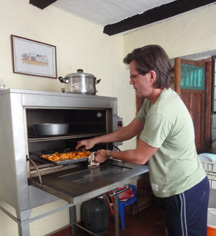 Taking a leap of faith, I gradually began to take charge of the kitchen, with Nattie and Fanny as my sous-chefs. My I-Phone has an app that instantly translates between Spanish and English, so this made our first cooking together experience much more pleasant. Nattie stands by my shoulder, watching and asking questions about everything I do. She didn’t know, for instance, to seed peppers to make them less spicy, or to de-stem herbs from their branches, as leaves alone provide a much fresher flavor. Nattie has never roasted vegetables in her oven, or used wine to deglaze a pan. I teach her how to make an apple cobbler. In the process, I learn the apples that grow on her tree in the backyard are about half the size of the ones I’m used to and (not surprisingly) about twice as delicious.
Taking a leap of faith, I gradually began to take charge of the kitchen, with Nattie and Fanny as my sous-chefs. My I-Phone has an app that instantly translates between Spanish and English, so this made our first cooking together experience much more pleasant. Nattie stands by my shoulder, watching and asking questions about everything I do. She didn’t know, for instance, to seed peppers to make them less spicy, or to de-stem herbs from their branches, as leaves alone provide a much fresher flavor. Nattie has never roasted vegetables in her oven, or used wine to deglaze a pan. I teach her how to make an apple cobbler. In the process, I learn the apples that grow on her tree in the backyard are about half the size of the ones I’m used to and (not surprisingly) about twice as delicious.
Nattie and I have a different sense of time, and what constitutes drudgery or not. For instance, each time she cooks with garlic, she laboriously peels each clove with a paring knife, then mashes it into a fine paste by crushing it under a smooth river stone. I show Nattie how easy it is to smash a garlic clove with the side of a chef’s knife, so the peel falls off. She smiles, feigning enthusiasm for my revolutionary method, but I notice Nattie continues to do it her own painstaking way.
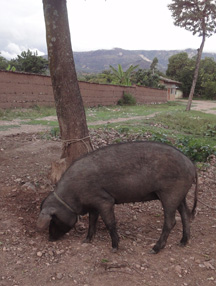 She is in no hurry, as there seems nothing but time in La Grama. Indeed, so little occurs here, that after just a couple days, I not only recognize all the town’sinhabitants, but I’ve started to become familiar with their animals, as well. I see ladies leading their cows out to the fields each morning, and home at dusk. Certain pigs are always tied to certain trees. Day after day, dogs sleep on the same patch of sidewalk. Hens and turkeys peck away at the dirt, only a few inches from where they’ll be tomorrow. For a week,this daily consistency is calming and reassuring. To stay here any longer, however, I would wither and die. La Grama is beautiful. I can clearly see that as I gaze at the rushing river, the sun-dappled fields, the big sky, the clouds drifting over the Andes, where slopes are covered with squares of different farms, like a patchwork quilt. Beautiful, yes, but static. My spirit and soul are too city-fied. Soon enough, I will crave a quickened pulse, and the beat, bang and boom of the city.
She is in no hurry, as there seems nothing but time in La Grama. Indeed, so little occurs here, that after just a couple days, I not only recognize all the town’sinhabitants, but I’ve started to become familiar with their animals, as well. I see ladies leading their cows out to the fields each morning, and home at dusk. Certain pigs are always tied to certain trees. Day after day, dogs sleep on the same patch of sidewalk. Hens and turkeys peck away at the dirt, only a few inches from where they’ll be tomorrow. For a week,this daily consistency is calming and reassuring. To stay here any longer, however, I would wither and die. La Grama is beautiful. I can clearly see that as I gaze at the rushing river, the sun-dappled fields, the big sky, the clouds drifting over the Andes, where slopes are covered with squares of different farms, like a patchwork quilt. Beautiful, yes, but static. My spirit and soul are too city-fied. Soon enough, I will crave a quickened pulse, and the beat, bang and boom of the city.
In the mean time, I become friendly with Cruz, a woman who lives in a house next door to mine. Each morning, I like to sit on the sidewalk in front of my house, bare feet in the dirt road before me. When she sees me, Cruz always says hello, and we talk about the weather. One day, she came out of her house, and gave me a bag full of lemons. (I’d seen her go inside with a long, bamboo pole a few moments earlier – Nattie has the same tool, to dislodge fruit from high branches.) I thank her profusely, and we attempt a longer conversation. Cruz tells me the house I’m living in is her son’s, and that he rented it to Jordan. I reply that it is “precioso,” and I am so lucky to be staying there.
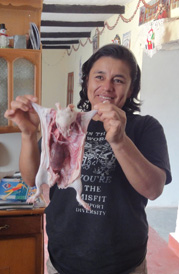 I work up the nerve to ask if she will show me her guinea pigs, or “cuy” as they are called in Peru. I guessed she must have a few dozen, as I can hear them scurrying about, squeaking, in the middle of night when I can’t sleep. Cruz didn’t hesitate, and seemed very proud to show me a back room of her dark and squalid house, where there must have been forty or fifty guinea pigs scurrying around. A few were pure white, others pale brown, but most a mottled mix. There was a kind of low stone wall bisecting the room. Cruz explained the guinea pigs are not smart enough to figure out how to scamper over this mini-barricade, so it kept them from crawling all over the humans while they sleep. How they could sleep through the squeaking and writhing of these animals was a bafflement to me.
I work up the nerve to ask if she will show me her guinea pigs, or “cuy” as they are called in Peru. I guessed she must have a few dozen, as I can hear them scurrying about, squeaking, in the middle of night when I can’t sleep. Cruz didn’t hesitate, and seemed very proud to show me a back room of her dark and squalid house, where there must have been forty or fifty guinea pigs scurrying around. A few were pure white, others pale brown, but most a mottled mix. There was a kind of low stone wall bisecting the room. Cruz explained the guinea pigs are not smart enough to figure out how to scamper over this mini-barricade, so it kept them from crawling all over the humans while they sleep. How they could sleep through the squeaking and writhing of these animals was a bafflement to me.
Cruz introduces me to her granddaughter. She is a gorgeous, slim-hipped girl of maybe sixteen, yet she already has a baby at her breast. This infant, also a girl, is obviously loved and well cared for, as her hair is pulled up into a little fountain at the top of her head, and fixed in place with a pink bow. Still, it’s sad. What happens to a sixteen-year-old mother in La Grama, Peru? And, when her baby daughter grows up, will she make the same mistakes?
I probably would have brooded on this more, but there was too much work to do! The garden behind el colegio slowly begins to take shape, while Nattie and I grow ever-more comfortable with our different ways of cooking. Not that there weren’t still some bumps along the way.
One evening, when I get to Nattie’s house, I see she’s busy making a cake for one of her clients. Some flour has spilled onto her painted concrete floor, and as Nattie moves about her kitchen, she’s begun to track white foot prints all over. I go get a broom and dustpan. When she sees what I’m doing, Nattie asks why I am cleaning up while she is still cooking. If we don’t get up the flour now, I say, other people will come in and out of the kitchen, and flour will be spread all over her house. Nattie looks at me, as if I am speaking utter nonsense. It is an awkward moment, as I can’t figure out what I’ve done wrong.
Later, Jordan tells me Nattie’s is one of the very few houses in La Grama that has a concrete floor, and even her’s is a recent improvement. When you are used to padding around on a dirt surface, sweeping up all the time is not part of your routine. Hearing this, I felt ashamed at how privileged my assumptions of “correct behavior” were. I can afford to be tidy, because my wealth has gotten me accustomed to high levels of hygiene. Nattie does not have this luxury.
Happily, such misunderstandings were few. Mostly, this unprecedented opportunity to pull herbs and vegetables directly from the earth has inspired me to leave aside my tried-and-true recipes, and take some gastronomic risks. How about squash, roasted with cinnamon, cloves and raisins? Lemongrass on the carrots? Beets with orange juice and walnuts?
What happens to a sixteen-year-old mother in La Grama, Peru? And, when her baby daughter grows up, will she make the same mistakes?
As Nattie and Fanny help me with such experiments, they’d tell me stories about life in La Grama. For instance, I asked about the guy with only one leg, who hobbles about on crutches. Turns out he was a farmer, and he cut his toe one day when he was in his fields, digging with a shovel. Badly gashed, the toe was nearly severed from his foot. He went to the local doctor, and they amputated the toe. Unfortunately, this surgery was done incorrectly, and the wound became infected. Now the foot was cut off, too. Soon the ankle became gangrenous, and amputations continued. First at the knee, and then the whole leg was removed, up to his hip. Only on this last operation were the proper amounts of antiseptic and suturing employed, and the man eventually healed. He could not longer work as a farmer, however. He spends most days shuffling about town, begging for money so he can buy beer.
I was forever using the wrong words in Spanish, and unintentionally saying something incomprehensible. Or obscene.
Another story concerned a baby born at La Grama’s small medical clinic. Only after the infant was out of its mother’s womb did the doctor realize they had no cloth to wrap it in. There was an old man waiting his turn for attention from the doctor. He was shivering with cold, clearly quite ill with some sort of influenza, or maybe even tuberculosis, and his whole body was convulsed with deep, rumbling coughs. The old man was wrapped in a dirty blanket. Without a moment’s hesitation, or even asking permission, the doctor snatched the blanket away from the old man, and wrapped the baby up in its filthy folds. Somehow, the baby survived. The old man did not; by the next morning, he was dead.
One day, as we were struggling to serve lunch, I said, “Nattie, tu necessitas una mesa grande en la cocina.”
She regarded me with a perplexed smile on her face. Nattie frequently looked at me this way, as I was forever using the wrong words in Spanish, and unintentionally saying something incomprehensible. Or obscene.
But, as far as I knew, I’d correctly told Nattie she needed to have a big kitchen table. The cooking area in her house was actually a good size, but there were no wide counter, or “island.” It was making me insane, trying to push out meals for 20 people, with no place to work other than a narrow ledge by her sink. To show her what I meant, I got out a tape measure, did some calculations, and drew a quick sketch of a table I thought Nattie should have. As you can see, I’d rapidly shed all qualms about my benevolently imperialist values.
Poor people are not stupid. Poor people are poor. The reason Nattie did not have such a mesa grande was not because she’d never imagined one; rather, she could not afford one. I told her I would buy it for her. I also mentioned I’d seen a guy doing carpentry work a couple streets away. What about him? No, Nattie said. He was too expensive and un borracho (a drunk). Instead, she knew another carpenter over in the next town, who she trusted and liked. Nattie suggested we go see him. It would be easy, she said. It was only a two hour walk. Each way.
Now it was my turn to have a perplexed smile. “Couldn’t we call first to make sure he’s there?” I asked.
He doesn’t have a phone, Nattie replied. He’ll be there, she assured me.
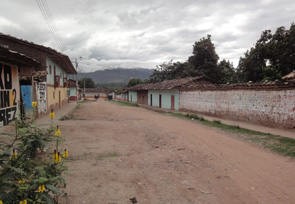 Right after lunch that day, we walked two hours, found el carpintero, Joel (for non-Spanish speakers, that is pronounced HO-elle), and I showed him my drawing. Joel named a price, which was absurdly low – I’d have paid five times as much, without question. Nattie reacted as if he’d demanded my left testicle. The two of them, Nattie and Joel, really got into it for a good long time. Negotiations between Special Ops and the Taliban are probably more congenial. Finally, to make peace, I stepped in, trying to save face for everyone involved. I told Joel I would somehow manage to pay his exorbitant price, the equivalent of $80, and I would even give him half the money up front. But the only way he was getting the rest was if he delivered the table on Friday morning (this was Tuesday afternoon). Saturday, you see, was December 25, which was also Nattie’s birthday, so a midnight dinner was planned on Christmas Eve. Dozens of townspeople had said they planned to drop by and wish Nattie a Feliz Navidad and Feliz Cumpleaños. Having a table would make all the difference in being able to host a crowd this size.
Right after lunch that day, we walked two hours, found el carpintero, Joel (for non-Spanish speakers, that is pronounced HO-elle), and I showed him my drawing. Joel named a price, which was absurdly low – I’d have paid five times as much, without question. Nattie reacted as if he’d demanded my left testicle. The two of them, Nattie and Joel, really got into it for a good long time. Negotiations between Special Ops and the Taliban are probably more congenial. Finally, to make peace, I stepped in, trying to save face for everyone involved. I told Joel I would somehow manage to pay his exorbitant price, the equivalent of $80, and I would even give him half the money up front. But the only way he was getting the rest was if he delivered the table on Friday morning (this was Tuesday afternoon). Saturday, you see, was December 25, which was also Nattie’s birthday, so a midnight dinner was planned on Christmas Eve. Dozens of townspeople had said they planned to drop by and wish Nattie a Feliz Navidad and Feliz Cumpleaños. Having a table would make all the difference in being able to host a crowd this size.
Joel agreed to my terms. I gave him the deposit. Our business settled, Nattie and I walked the two hours back to La Grama. I was feeling pretty goddam proud of myself – that is, until I saw Jordan and told him what I’d done.
“You just threw away your money,” he said. “This is Peru, Stephen, not Manhattan. I would be surprised if someone in this country could make a table like that in two months, and you gave him two days? Are you smoking crack?”
“Joel said he could do it,” I replied. Even to me, my voice sounded small and annoying, kind of like a guinea pig’s squeak. Jordan wasn’t being mean. He was realistic. I, on the other hand, was an idiot. An imperialist idiot.
Nattie kept the faith, though. She began to tell everyone about la mesa grande. I’d redrawn my sketch to give a carefully-ruled copy to Joel, but Nattie thumb-tacked the first draft I made up on her kitchen wall, right next to a garish color illustration of the Blessed Virgin Mary. (Peru is an exceedingly Catholic country.) Other ladies began to drop by, and gaze expectantly at the empty space in the center of Nattie’s kitchen, where the table would go. It seemed this was the most exciting thing that had happened in La Grama in months. I couldn’t even look at Jordan. I tried to forget the whole mess, and redoubled my efforts on the organic garden.
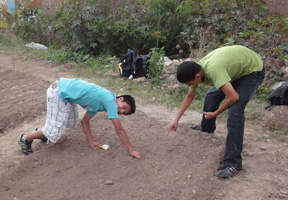 After several days of preparatory work – clearing away large rocks,and creating a series of raised, rectangular beds – it was time for seeds! Several dozen children showed up for planting day, and I asked three boys to help me: Carlos, Franklin, and Angel. They were probably 14-years-old, and full of smirks and squiggles. Indeed, nearly everything I did or said caused them to react with exaggerated shock, and then to collapse into fits of laughter. It was hilarious, I’ll admit, as my Spanish vocabulary for describing spatial considerations – depth, distance,orientation – was quite limited. I relied heavily on pantomime. Angel, Franklin, and Carlos were clever young men, however. They took the seed packets from me, and quickly showed me how it was done. Um, who was helping who here?
After several days of preparatory work – clearing away large rocks,and creating a series of raised, rectangular beds – it was time for seeds! Several dozen children showed up for planting day, and I asked three boys to help me: Carlos, Franklin, and Angel. They were probably 14-years-old, and full of smirks and squiggles. Indeed, nearly everything I did or said caused them to react with exaggerated shock, and then to collapse into fits of laughter. It was hilarious, I’ll admit, as my Spanish vocabulary for describing spatial considerations – depth, distance,orientation – was quite limited. I relied heavily on pantomime. Angel, Franklin, and Carlos were clever young men, however. They took the seed packets from me, and quickly showed me how it was done. Um, who was helping who here?
If there is a God, She or He seemed to be giving a (green) thumb’s up.
When we were ready to water our beds, the pump, for some reason, was nowhere to be found. So, a chain of hoses were stretched from the garden back to the school building, where there was an outdoor spigot. These hoses, alas, were old and worn, and not spliced together with screw-together junctions. Rather, the end of one hose was simply pinched, and shoved into another. Every time we stretched it even a foot longer than it wanted to go, the different sections of hose would slide apart. Water gushed everywhere, except into the garden. This caused still more shrieks of laughter from the children, and much head-scratching for the adults.
Just then, however, dark clouds appeared on the horizon, rolling quickly towards us over the top of nearby hills. Skies quickly changed from blue to black, the air temperature dropped just as rapidly, and … Boom! Rain was rocketing down around us. The Peruvian kids scattered at the first drop, but we Americans were too grateful to move. If there is a God, She or He seemed to be giving a (green) thumb’s up.
Back at Nattie’s house, I discover there is no electricity. Apparently, this is a frequent enough occurrence in La Grama, and there’s no knowing when it may come back on. Maybe it was the romance of cooking by candlelight, but suddenly I had the great idea to make a carrot cake for Nattie’s birthday. Some substitutions were required, since I couldn’t just dash over to Whole Foods for box of Macadamia nuts, or cream cheese. While I was out in the garden, digging around for zanahorias (carrots), Nattie came rushing out her back door.
“Ven aqui!” she cried. “Ven aqui, ven aqui, ven aqui!” Said once, “ven aqui” means “come here!” When it’s rapidly said three times, however, it roughly translates as, “Get the fuck in here, NOW!”
Because I’m a worrier, I immediately assumed the worst. Some guy had been stabbed in a drunken brawl, or a girl had died from a botched abortion. For all the natural beauty of its location, horrible things happen in La Grama. I’d only lived there for one short week, but already I’d had ample opportunity to learn that.
I rushed into the house, and there was Joel, huffing and puffing his way through Nattie’s front door, with la mesa grande on his back.
I couldn’t believe it. He’d finished a day early!
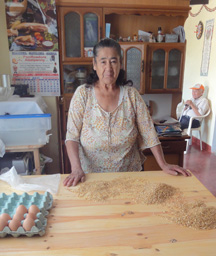 I’m not a decorator, and this piece of furniture I’d designed was no work of art. However, it was well-made, appeared solid and strong, and Joel had even thought to give a wax finish to the wide planks of wood on its top surface, to repel fluids and grease. It was a true work table, a thing honest and proud, and I could tell at a glance it would serve Nattie well for many years to come.And so could she. The expression on her face! It was as if Nattie had just been informed that she would never die, but live forever in a perpetual state of youth, beauty, and health. You’ve sometimes heard it said a person’s face will glow? Nattie’s was a beacon.
I’m not a decorator, and this piece of furniture I’d designed was no work of art. However, it was well-made, appeared solid and strong, and Joel had even thought to give a wax finish to the wide planks of wood on its top surface, to repel fluids and grease. It was a true work table, a thing honest and proud, and I could tell at a glance it would serve Nattie well for many years to come.And so could she. The expression on her face! It was as if Nattie had just been informed that she would never die, but live forever in a perpetual state of youth, beauty, and health. You’ve sometimes heard it said a person’s face will glow? Nattie’s was a beacon.
I’d long since given up all hope for this moment. As such, it felt nearly like a dream to help move la mesa grande into the kitchen where, I was relieved to see, it fit perfectly. I paid Joel the balance of what I owed, and then I made a pantomime, bowing to him as if he were a King, or a deity. This tickled Joel no end. He laughed and swept me up into a lung-crushing hug. As I was catching my breath, in walks Jordan.
We all began to laugh, scream, and hop about the kitchen in silly, spontaneous celebration. The happy, happy noise Nattie, Joel, Jordan and I made was loud enough for my soul to hear.
On the face of it, the four of us were all so very different: Nattie and Joel are Roman Catholics; Jordan is a Jew; and I’m a former-Baptist-converted-to-Episcopalian-turned-agnostic. We were three men and a woman. Two Peruvians, two New Yorkers. English-speakers, Spanish-speakers. Yet, all our many differences were absolutely meaningless in this moment of unified, transcendent joy. Why are we alive, other than to share love with others? Why are we alive, other than to find ways to connect, not separate?



